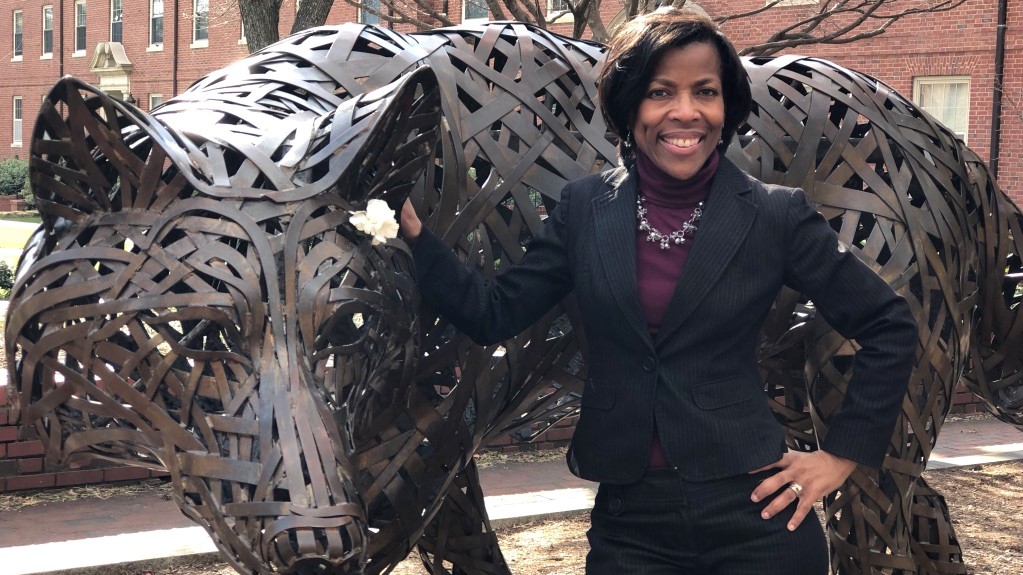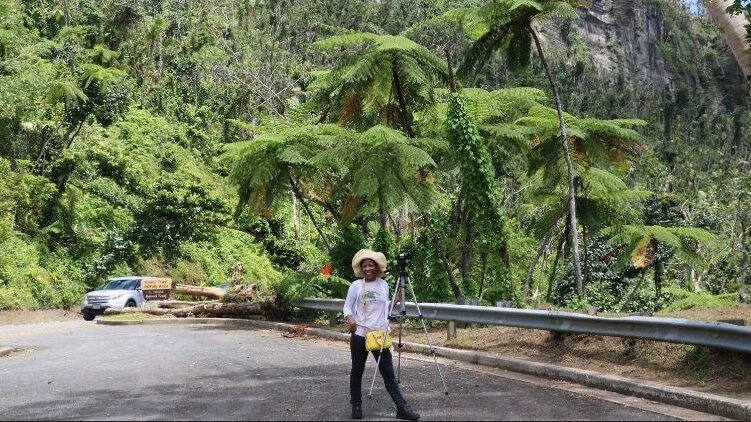Researcher Spotlight – Melody Hunter-Pillion

2021-22 Global Change Fellow
Ph.D. student, Department of History
Advisor: Dr. Blair L.M. Kelley
Every year the Southeast Climate Adaptation Science Center funds a multi-disciplinary cohort of Global Change Fellows representing colleges across NC State University. The current cohort of students represents the decadal anniversary of this program! Here are some highlights about 2021-22 Fellow, Melody Hunter-Pillion and the applied research she’s conducting.
About You
What do you study?
I study public history and public memory with a focus on African American oral traditions. Although my current project examines narratives of Black farmers and fishers in eastern North Carolina, I connect my work to Atlantic World history and diasporic communities for international context. My first opportunity to practice oral history on a professional level came through SE CASC as their oral history advisor for their Caribbean oral history project, Voices of the Caribbean, archived in the Digital Library of the Caribbean (dLOC). The project enhanced my expertise, which has given me the opportunity to speak with science communications and journalism students at Columbia University and an upcoming lecture event with the Oral History Society, based in the United Kingdom. I am grateful to my dissertation chair, Dr. Blair Kelley for building my confidence as an oral historian. I am a trained journalist, and oral history is a different practice from journalism.
What (or who) influenced you to go into this field of study?
With a background in journalism—and having been raised in the rural South—I wanted to examine how communities build stories that shape their identities and their responses to the world around them. Storytelling and memory are important components of history and of responding to present circumstances. Oral history allows us to add to the record that which would not have been included in the historical record if not for these interviews. As young adults, my grandparents worked as sharecroppers in rural North Carolina. No one sought out their stories, distinctive American stories of family, struggle, and perseverance. I realized how much we can all learn from lived experiences that have previously been excluded from historical accounts but remain central to our nation’s shared history and to creating solutions for current challenges. Plus, I am fascinated by individual stories.
What do you think is the most pressing issue related to global change?
The most pressing issue related to global change depends on who you are and where you are. Sea level rise is a concern to all of us, but how each community experiences climate change will be different, and it will require different responses for resilience and adaptation. The most pressing issue will be motivating local communities to make decisions in a timeframe that allows them to have more than one option and seek diverse voices to be part of those decisions. Communications, history, and other humanities disciplines are a necessary element in community collaboration. As a storyteller, I center local stories as a significant source for recognizing, understanding, and responding to environmental change. As a historian, I value firsthand accounts as well as lessons we can learn from the past. Collaboration between affluent communities, marginalized communities, scientists, and humanists will be a challenge but a necessary goal in understanding and addressing global change on local fronts.
What are three words your friends would use to describe you?
Energetic, hard-working, generous.
About Your Research

What is the most important thing that you’ve learned?
The most important thing I have learned is that the people who live in any given space know their environments better than anyone else. They are eyewitnesses to climate change and its impacts. The subtle changes are apparent to them. The changes impact ecosystems, culture, economy, and have historical context. I have learned how distinct communities connect landscapes to history over time and make intergenerational connections. Everyone’s story is valuable, and place-based stories may help instruct communities during crises.
How can your research be used to inform management decisions?
My research includes the voices of community members. Community-informed decision making helps policy makers and natural resources managers develop better strategies for those who live in impacted areas.
How would you describe your research to a 3rd grader?
To a third grader, I would describe my research as being just like if they asked their grandmother or grandfather to tell them a story about the trees and birds in their yard now; and then ask what the trees and birds were like in their yards when they were children? I would ask those third graders to write out questions they would ask of their grandparents about the sky, the river, lake, animals they remember. I would love to know their questions.
How would you describe your research to an expert in another scientific field?
To an expert in a scientific field, I would describe oral history research as a methodology that captures the lived experiences of people in a defined space as recorded data that can be used in tangent with climate data, species projections, and maps. Oral histories are data sets of another sort. They provide a particular depth and nuance that fills the gaps science cannot measure. Individual testimonies help scientists to understand the historical and social context which have shaped what on the surface appears to be only scientific in nature. Understanding the history behind the numbers may help us understand resiliency and adaptation and the best ways to approach solutions that the community will embrace and use
About Your Global Change Fellow Experience
How do you expect the SE CASC Global Change Fellows Program to impact you and your work?
The SE CASC Global Change Fellows Program has already impacted my work by connecting me with scholars in other disciplines. It has also introduced my work to oral historians on a global level. In offering interdisciplinary opportunities, my discussions with avian ecology doctoral student Lauren Pharr and landscape design graduate student Stephanie Kelly have expanded my way of thinking about how to use oral histories. I can be more creative now in how to integrate oral histories into community projects. My cohort members have introduced me to professors and scholars in their fields, invited me to seminars, shared reports and resources, and listened to my ideas. Their collaboration has been invaluable in guiding my research and innovating my approach. Funding from the fellowship has also allowed me to plan out field time for collecting more oral histories and strengthening the case studies for my dissertation.
What has been the most rewarding part of being a SE CASC Global Change Fellow?
Being with and learning from the other Fellows has been my favorite part of being a SE CASC Global Change Fellow. I am building helpful and enjoyable relationships. Also, having the mentorship and insights of program Director Aranzazu Lascurain has been extremely rewarding. If you have an idea, Aranzazu knows the person or resource you need to explore and expand your idea. Her support is constant.
What advice would you give to an incoming Global Change Fellow to get the most out of their experience?
My advice to incoming Global Change Fellows is to be open to all the information, scholars, fellows and experiences. The very thing you believe has nothing to do with what you are studying or how you are conducting your research, may be the catalyst for work that breaks through. If your discipline is in the humanities, the program makes it comfortable to embrace science at the level that works for you. If you are a scientist, the fellowship program offers humanities angles to strengthen your work with communities.
